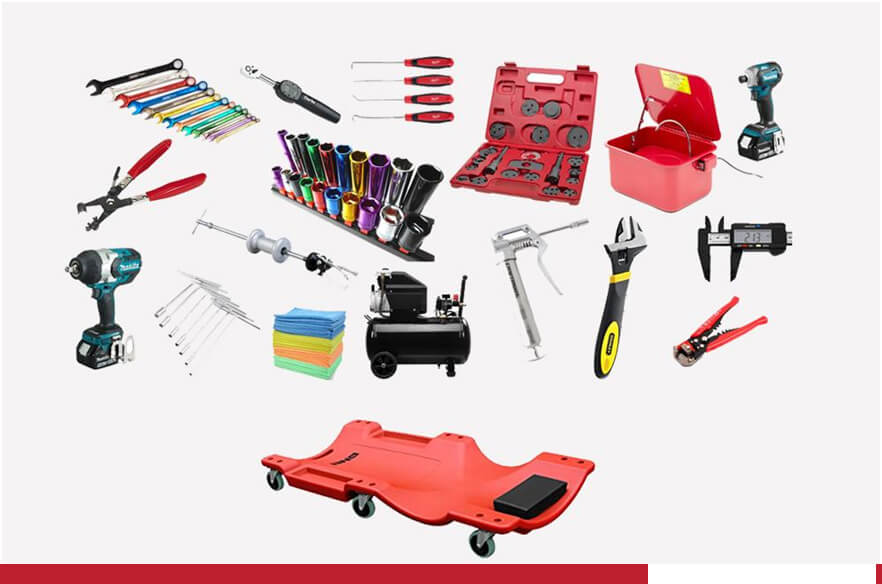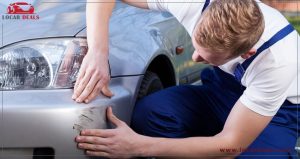Auto mechanics is a dynamic field that involves vehicle inspection, maintenance, and repair. Mechanics ensure that vehicles operate efficiently and reliably, diagnosing mechanical issues and fixing them using various tools. The right tools are not just necessary. They are the backbone of every successful mechanic’s arsenal, allowing for the precise, efficient, and safe repair of automotive problems.
This article will guide you through the essential tools every auto mechanic should have, from fundamental hand tools to more powerful electric and pneumatic devices. Whether you’re just starting in auto repair or looking to brush up on your tool knowledge, we’ll explore the tools auto mechanics use for various tasks in automotive work.
Hand Tools

Screwdrivers
In auto mechanics, screwdrivers are used almost daily for a variety of tasks, such as disassembling engine parts or opening up panels. There are several types needed:
- Flathead screwdrivers are useful for screws with a single horizontal indentation.
- Phillips screwdrivers fit screws that have a cross-shape slot.
- Torx screwdrivers have a star-shaped tip and are important for vehicles that use security features.
- Allen screwdrivers (or hex keys) are used for hexagonal-shaped screws, often found in brake callipers or interior components.
Each type of screwdriver fits a specific type of screw, and using the correct one makes the job easier and prevents damage to the screws or the tool.
Wrenches
Wrenches are crucial for any mechanic, needed for tightening and loosening bolts and nuts:
- Combination wrenches have an open end and a boxed end, suitable for a variety of tasks.
- Adjustable wrenches have a movable jaw, allowing them to fit various sizes of bolts and nuts.
- Torque wrenches are essential for applying a specific torque to a nut or bolt and are critical in many parts of the assembly to ensure parts are neither too tight nor too loose.
Using the right wrench ensures that fittings are secure and undamaged, which helps maintain vehicle integrity and safety.
Pliers
Pliers come in various shapes and sizes, each suited to specific tasks:
- Needle-nose pliers are good for reaching into tight places and gripping small objects.
- Locking pliers can be locked into position, providing extra grip.
- Wire strippers are used to cut and strip insulation from electrical wires.
Pliers are invaluable when it comes to electrical tasks, handling springs, and gripping or bending materials that are too small or too stiff to manipulate by hand.
Power Tools
Impact Wrenches
Impact wrenches are powerful tools that make removing bolts and nuts incredibly simple and quick. They deliver high torque output with minimal exertion by the user, which is perfect for disassembling large engine components or loosening over-torqued bolts. Most auto mechanics will use pneumatic (air-powered) impact wrenches, although electric models are also quite popular.
Air Compressors
An air compressor is a staple in any auto mechanic’s garage. It powers various tools such as impact wrenches, pneumatic ratchets, and spray guns. They are also used to inflate tires to the correct pressure. Choosing the right air compressor involves understanding your tools’ air pressure and volume requirements.
Cordless Drills
Cordless drills are used for drilling holes and also serve as powerful screwdrivers. With the right attachments, they can be used to remove screws, mix automotive fluids, and more. Their cordless nature means you can use them anywhere in the workshop without worrying about trailing cables or finding a power outlet.
These tools are fundamental in any mechanic’s toolbox, whether you are just beginning your career or are a seasoned professional. They save time, reduce the physical strain of manual work, and increase the accuracy and quality of automotive repairs. With the right tools, you can ensure that any vehicle you work on is serviced to the highest standard, keeping drivers safe on the road.
Garage Necessities
Hydraulic and Scissor Jacks
When working on cars, having a reliable set of jacks is essential. Hydraulic jacks are preferred for their ease of use and power, which make lifting a car simpler and safer. Scissor jacks, while more manual, are compact and handy for quick roadside repairs. Choosing sturdy, well-made jacks can prevent accidents in the garage.
Safety is paramount when lifting vehicles. Always ensure the jack is firmly positioned on a flat surface before lifting. Never get under a car supported only by a jack; always use jack stands to stabilize the vehicle once it is lifted. Checking the weight limits for both the jacks and the stands is crucial, as exceeding these limits can lead to dangerous failures.
Automotive Creepers
Using a creeper makes under-car tasks much less of a hassle. A creeper is essentially a flat board with wheels that lets you slide comfortably underneath a vehicle. The benefits include comfort, speed, and safety when working in a car.
When choosing a creeper, look for one that is padded for comfort and durable enough to withstand the weight and movement required when sliding under cars frequently. The wheels should roll smoothly and be strong enough not to falter on small obstacles like pebbles or tools. A creeper that can fold into different shapes can also be very handy, providing various support angles for different tasks.
Proper Lighting Solutions
Proper lighting in a garage is critical. LED headlamps and work lights ensure that you can see clearly, which not only makes the work easier but also significantly safer. LED lights provide bright, focused light that can pinpoint the area you are working on, which is perfect when dealing with intricate components.
Using adequate lighting helps avoid mistakes, such as improperly fastened bolts or misdiagnosed leaks, which are common when working in poorly lit conditions. It also reduces eye strain, as trying to focus in dim light can cause significant eye fatigue over time. Therefore, investing in good quality, durable lighting tools is a wise decision for any mechanic.
Diagnostic and Specialty Tools
OBD II Scanners
OBD II scanners are crucial for modern auto diagnostics. These tools plug directly into the onboard diagnostics port of a vehicle to read diagnostic trouble codes (DTCs) from the car’s computer system. These scanners can provide a wealth of information about the car’s engine and transmission health, emissions system, and more.
When selecting an OBD II scanner, consider what functions you need. Basic scanners read codes, while more advanced models can provide real-time data, system tests, component tests, and even programming capabilities. Make sure the scanner is compatible with the make and model of the vehicle you are working on, as not all scanners cover all cars.
Multimeters
Multimeters are used to measure voltage, current, and resistance, which are essential for diagnosing electrical problems in vehicles. They can help trace faults in wires, check battery voltage, and much more.
Basic multimeters are suitable for simple tasks such as checking battery voltage, while advanced models can measure capacitance, frequency, and temperature and even provide graphical readouts. Choose a multimeter that’s easy to use and read, with a sturdy case and protective features like a fuse for overload protection.
Tool Organization and Maintenance
Toolboxes and Organizers
Good tool organization is key to efficient automotive work. It saves time and prevents tools from being damaged or lost. Toolboxes and organizers vary widely in size, style, and material, allowing mechanics to choose one that best fits their needs.
- Portable toolboxes are great for those who need to transport tools between locations.
- Cabinet-style toolboxes are ideal for extensive collections of tools that are used in one place.
- Tool bags are flexible and can be a lightweight alternative for carrying a small selection of tools.
Organizers such as socket holders, wrench racks, and magnetic tool holders keep tools in place and can be very helpful in keeping your workspace tidy and your tools readily accessible.
Purchasing Reliable Auto Parts and Tools
When it comes to automotive tools and parts, the cheapest option is not always the best choice. Investing in high-quality tools can save you money in the long run, as they last longer and can prevent damage to parts that are expensive to replace. They are typically made from superior materials and have better engineering, which means they can handle the wear and tear of regular use without failing.
AutoPartsWAY stands out as a trusted store for quality auto parts and tools, offering a wide selection to meet all your automotive needs. Whether you are a professional mechanic or a DIY enthusiast, AutoPartsWAY provides high-quality tools that combine efficiency with safety.
As automotive technology evolves, it is crucial for mechanics to continually update their toolsets to keep up with new vehicle models and repair techniques. Staying equipped with the latest tools enhances your ability to perform repairs effectively and ensures that you can meet the changing demands of the industry.









This is a very good article, pls keep it up